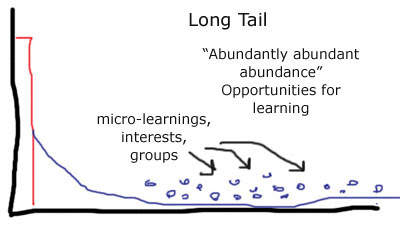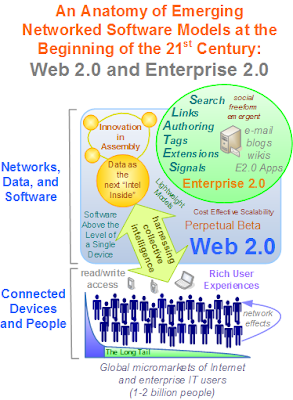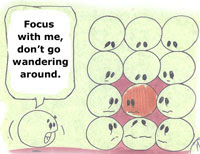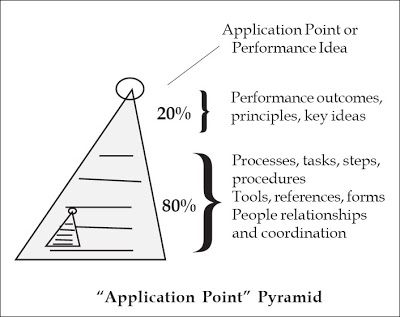Microlearning to me is a key aspect in the rapid e-learning, social networking, e-Learning 2.0 world. People don’t really learn huge content at a time, but only bits and pieces. As we accumulate tools to distribute data and knowledge at…
Author: Ray Jimenez, PhD
“Abundantly abundant abundance” data does not mean learning
I relate to what Nick Carr was saying about “Abundantly abundant abundance“ Carr was referring to the overload of videos, graphics, photos, and pages in MySpace, Facebook and many other personal Social Networking tools. The overload causes fatigue, exhaustion and…
TrainingTech Solutions – Salt Lake Conference
I am scheduled to present in the following sessions at the TrainingTech Solutions Conference in Salt Lake City on Oct. 12-16, 2007 1. Rapid e-Learning Design Workshop 2. LMS 1. 2, LMS 2 and Beyond 3. Integrating Social Networking to…
Micro-Learning Impacts: Training Magazine Event Study
We just released a study and report on “Micro-Learning Impacts.” This study (on-going) was conducted in cooperation with Training Magazine Events showing how learners learn, apply, network, and measure results. The participants submitted micro-goals, networked with their leaders and peers,…
Tony Karrer, George Siemens – Online Conference
Gary Hamel – The Future of Management – Web 2.0 and Community Driven Management Models
In Gary Hamel’s most recent book “The Future of Management” published at the Harvard Business School Press, he expresses his view of the future of management. He suggests that in the future, enterprises’ organizations will resemble “community-driven” models of Web…
Organics and Stories: 50 Web 2.0 Ways to Tell a Story
At the heart of 3-Minute e-Learning (2007), I recommend to e-learning developers, SMEs, and project managers to use organics: stories, metaphors, cases, scenarios, narratives, and others. Organics help learners learn quickly because they can relate the content to a real-life…
Consequences of skipping formal learning
San Jose, Ca, Airport: Mobile log I am curious and have to research this issue. Please help. Do Web 2.0 and Enterprise 2.0 offer solutions for supporting formal learning, specifically micro-learning? I do not refer to classroom training. I am…
e-Learning 2.0 Driven by Web 2.0 “SLATES”
Dion Hinchcliffe made a good summary of where Web 2.0 is impacting Enterprise 2.0. In his article he summarizes the new reports from Forrester, CIO Insight and McKinsey that suggests the faster adoption of Web 2.0 in enterprises. What is…
Why measure learning and relevance in technology
Will Thalheimer’s “Reason to Measure Learning” reminds me of why it is still relevant to measure learning. My question is, in the fast world of social networking applied in organizational learning, what happens to learning measurement? Does learning overlap tightly…
Smaller Niches in Social Networking Support Micro-Learnings
Ross Mayfield pointed out that “Widgets and (Web Widget) are the battering rams that will fracture the sand castles of large social networks.” A Flickr widget brings people together around an object. A photo with an attached story can be…
37% Adults Use Social Networking – Adoption to e-Learning
Social networking is perceived by many adults as a waste of time. This is perhaps changing. Financial Post reported that 37% of adults visit social networking sites, 27% who visit FaceBook create a profile. I remember the time when corporate…
Facilitating Learning: On-grid and Off-Grid
Rick Borovoy, Co-Founder and CTO of nTag Interactive, has been doing a lot of experiments in helping implement a technology-assisted learning process where learners go back and forth from being “On-Grid” and “Off-Grid”. He refers to “On-Grid” as following a…
If the CFO knows the waste of non-reusable e-learning content, would they approve the budget?
REUSABILITY is not a technical term; it should be a term for the learners. Those of us who design systems use the word “reusability” from a technical view without understanding what the learners really want or need. What does reusability…
Isolating Performance Content with “Application Points”
To add to Clive Shepherd’s 30-Minute Masters (Clive, Your Wiki is a great practice of user content sharing), there is a need to help trainers, SMEs, leaders, and speakers to isolate “Application Points” from a huge body of content. “Application…





